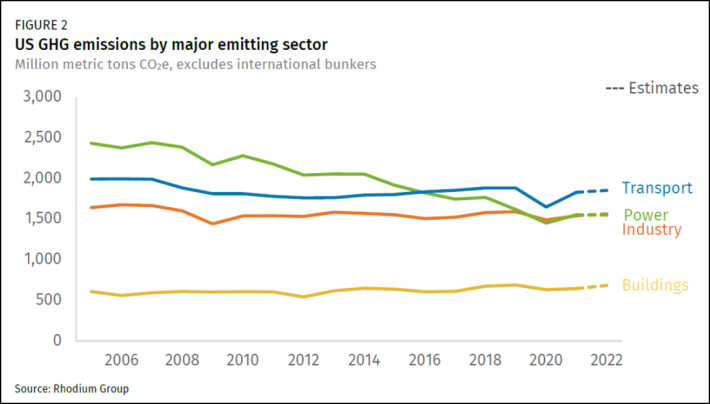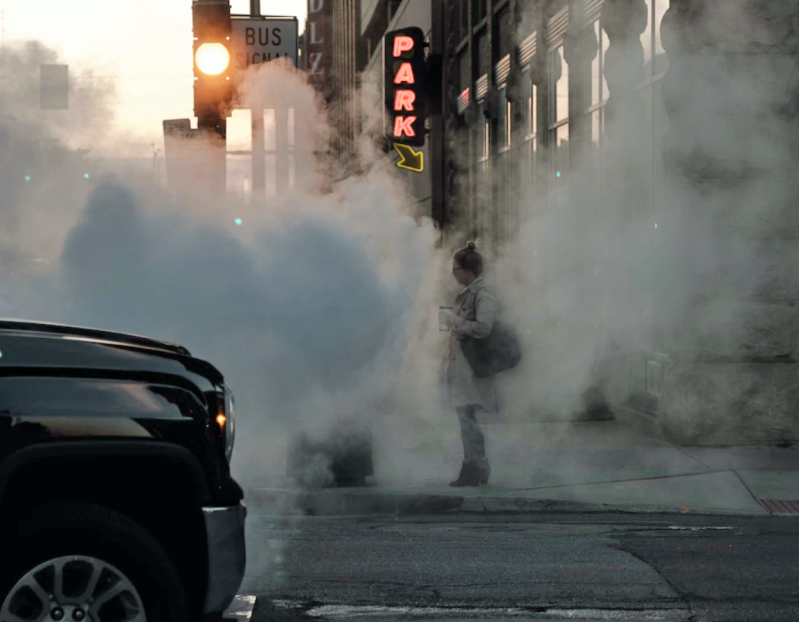America's transportation sector remains the leading national driver of the climate crisis — and automobile drivers aren't helping.
According to preliminary estimates from analysts at the Rhodium Group, overall greenhouse gas emissions increased 1.3 percent between 2021 and 2022, thanks in part to a parallel 1.3-percent increase in the transportation sector driven by a combination of increased jet fuel demand and steady consumption of gasoline in passenger cars. The transport sector once again outranked power, building and heavy industries for the title of the dirtiest segment of the U.S. economy, as it has since 2016.

On a more positive note, researchers pointed out that 2022's GDP growth actually outpaced the increase in GHG emissions — but that promising trend was mostly attributable to increased use of renewable energies and natural gas over coal power, and those gains were erased by pollution in other areas.
The report authors praised the Biden administration for passing significant climate provisions as part of the Inflation Reduction Act, but warned that even rapid implementation of those policies would likely still lead the U.S. to fall short of the goals outlined under the Paris Climate Accords. The transit aspects of the bill, in particular, have faced criticism from experts like the Urban Institute's Yonah Freemark, who called them "inadequate" in a September article and noted that they "focused on road vehicle electrification" to the exclusion of policies that encourage travelers to shift trips to shared and active transportation.
"Even with the IRA, more aggressive policies are needed to fully close the [emissions reduction] gap ... by 2030," the Rhodium researchers wrote. "In 2023, federal agencies can close this gap further by proposing aggressive regulations that drive down emissions. These actions, together with additional policies from leading states as well as action from private actors, can put the target within reach — but all parties must act quickly."
Whether Washington is prepared to act quickly enough to tackle its transportation emissions challenges, though, remains to be seen.
On the same day that the Rhodium report was released, the Biden Administration released its own National Blueprint for Transportation Decarbonization, which, to its credit, acknowledged the importance of walkable community design alongside "expanding affordable, accessible, efficient, and reliable options like public transportation." That plan, however, failed to set an explicit mode shift goal or make commitments to enhancing the infrastructure and services that might make it possible — and took pains to specify, in bold font, that "transitioning to clean [vehicles] is expected to drive the majority of emissions reductions." (Emphasis theirs.)
Study after study (after study after study after study), meanwhile, has shown that it would be virtually impossible for America to electrify its gas-powered vehicle fleet fast enough to meet its transport sector emissions goals without also rapidly reducing the amount that Americans drive in personal cars, regardless of their power source.
Sorry to be the bearer of bad news, but there’s no way we’re eliminating transportation emissions without a big new commitment to expanding transit *service*, which is conspicuously missing from this plan: https://t.co/jHKCZPwDV7
— TransitCenter (@TransitCenter) January 11, 2023






